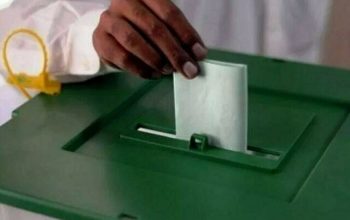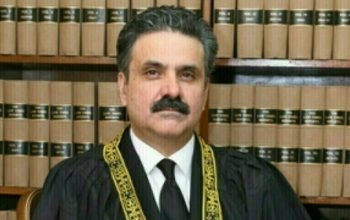As political tensions reach a boiling point, the government, rather than seeking reconciliation, appears to have stirred the pot by taking an aggressive stance against PTI and the superior judiciary.
The controversial decision to ban PTI, now the largest party, defies multiple judicial affirmations of its parliamentary status and rights to reserved seats.
Former Additional Attorney General Tariq Mahmood Khokhar highlighted that according to Article 17(2) of the Constitution and Section 212 of the Election Act, 2017, the federal government has the authority to declare a political party as foreign-aided, prejudicial to Pakistans sovereignty, involved in terrorism, or operating in a manner detrimental to national integrity.
Once such a declaration is made in the official gazette, the government must refer the matter to the Supreme Court within fifteen days. "Where the SC upholds the declaration (based on evidence), such political party stands dissolved forthwith followed by other effects of dissolution."
Khokhar pointed out that unless and until the apex court upholds the government's declaration, there will be no significant legal consequences, neither a loss for the PTI nor a gain for the illegitimate federal and provincial governments, unrepresentative legislatures, and dysfunctional institutions influenced by malign players.
"In simple words, there will be no constitutional amendment package," he said, adding that it was beyond the realm of possibility that the SC would uphold such an obviously mala fide declaration.
'The root cause of it all may well be ignorance, stupidity, fascism or, more likely, a simple diktat. Such course of action may constitute subversion of the constitution, rule of law and democracy by other means,' he added.
Khokhar, however, said that there ought not to be any surprise. "Most people were expecting an idiotic 'legal astonisher' as a reaction to the SC decision in the reserved seats case. They are doing all they can to lower themselves."
Another lawyer questioned how the government, with the majority's rejection of its stance in the reserved seats case, expects to have its cake and eat it too by banning PTI through the apex court amid ongoing tensions between the judiciary and executive, — which were underscored by the recent letter from six IHC judges regarding agency interference in judicial functions.
The government was banking on the majority to give such an opinion paving the way for a two-thirds majority in parliament. However, the majority ruling has dashed the government's hopes by affirming PTI's entitlement to reserved seats, he noted.
With the PMLN-led government not in danger, he asked why is it making a mountain out of a molehill over a top court's judgment that doesn't affect its status. Nonetheless, there's palpable panic within the government camp about the SC order.
The debate continues on why the judicial package is a make-or-break issue for the government.
On the other hand, there is a realization within PML-N's legal minds about the implications of the government's aggressive policy toward the majority judges who ruled that reserved seats must be given to PTI.
A senior member of the cabinet expressed disappointment that some PML-N activists were propagating against Justice Syed Mansoor Ali Shah who will be the next chief justice of Pakistan in October. He mentioned that he would raise this issue with PML-N chief Nawaz Sharif.
However, one faction within PML-N opposes an aggressive policy toward the judiciary.
Meanwhile, it was also learned that the PML-N leadership has postponed a meeting scheduled to be held in Murree on Monday.
After the Supreme Court judgement in the reserved seats case, the federal government is struggling to get relief from lower courts.
Additional Sessions Judge Islamabad Muhammad Afzal Majoka on Saturday quashed the conviction of ex-prime minister Imran Khan and his wife Bushra Bibi in the Iddat case. Likewise, the local magistrate in Islamabad acquitted PTI activist Sanam Javed in the FIA case.
Senior lawyers believe that pending election petitions in the tribunals pose a real threat to the current government. The fate of these election disputes will be decided by the superior courts.
A senior political leader remarked that if the government continues to pressure the judges, matters related to election disputes will be expedited, putting the current regime in jeopardy.
Interestingly, the detailed judgment in the reserved seats case is still awaited. It is understood that the SC has yet to schedule PTI's petition probing allegations of rigging in the general elections.
One lawyer suggested that the government was deliberately creating a crisis. First, the TLP sit-in continues at Faizabad, Islamabad, and second, the government intends to use the parliament forum against the top court.
Read the full story at the express tribune website.


